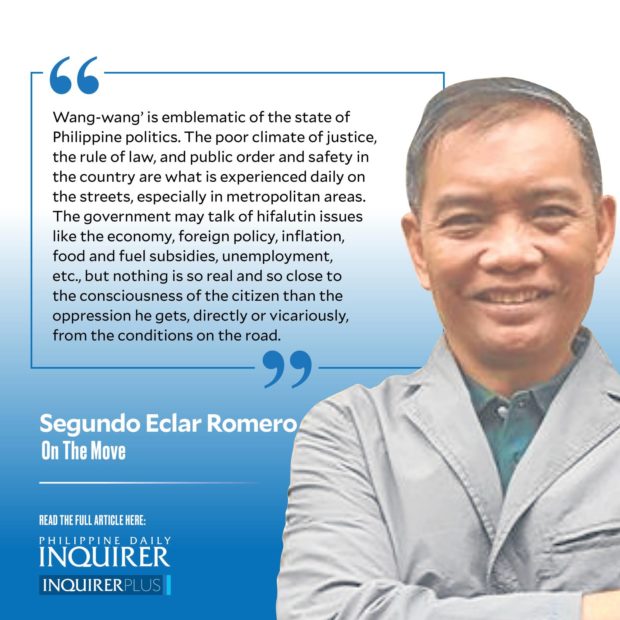The ‘wang-wang’ divide
Wang-wang” season is like the first day of school for many new senators and congresspersons, secretaries, undersecretaries, assistant secretaries, and over 16,000 elected officials. Instead of schoolbags and crayolas, however, they acquire the trappings of power—huge SUVs with heavily tinted windows, low number plates, stickers, and of course, “wang-wangs.”
Consider “wang-wang” season a celebration of the political harvest, a signal of the changing of the guards, or the renewal of the governing elite. “Wang-wang” season never really fades completely. It simply becomes more pronounced every six years, like the return of the cicadas.
“Wang-wang” is emblematic of the state of Philippine politics. The poor climate of justice, the rule of law, and public order and safety in the country are what is experienced daily on the streets, especially in metropolitan areas. The government may talk of hifalutin issues like the economy, foreign policy, inflation, food and fuel subsidies, unemployment, etc., but nothing is so real and so close to the consciousness of the citizen than the oppression he gets, directly or vicariously, from the conditions on the road.
P-Noy understood “wang-wang” was just the tip of the iceberg of self-entitlement, abuse, and corruption that lay beneath. Upon becoming president, he waged a very public and personal campaign against “wang-wang” that has robbed Filipinos of a fair chance to improve their lives. This idea resonated so strongly and widely among the people that they rallied around P-Noy and the display of self-entitlement withered quickly on the streets.
People widely understood that if simple rules cannot be implemented fairly and universally at the street level, it is doubtful that the democratic and constitutional guardrails work at higher levels, where the citizens can no longer pierce through the veil of official impunity.
How important was the anti “wang-wang” campaign of P-Noy? In a blog written on Jan. 22, 2013, (https://bit.ly/3yWGg8n), Daron Acemoglu and James Robinson, the celebrated authors of the 2012 bestseller and classic “Why Nations Fail” wondered why the Philippines has “failed to become a ‘Tiger economy’ and how contemporary politics is riven by dynastic control and clientelism.” They asked, “Is there a way out?” They answered with a hopeful “yes,” pointing to P-Noy’s inaugural State of the Nation Address where he excoriated the “wang-wang” practice.
To Acemoglu and Robinson, “wang-wang” is not only the blaring sirens but “is commonly used in the Philippines to refer to the syndrome of corruption and lack of accountability of elites which plagues politics in the country.” Acemoglu and Robinson thought that P-Noy had a fair chance of reversing this dynasty-driven “wang-wang” phenomenon.
They mentioned several positive factors: (1) The military was then squarely within civilian control, unlike the time of Cory Aquino; (2) P-Noy had forged a multifaceted strategy—greatly expand a conditional cash transfer program (CCT), community-driven development (CDD) that delivered resources and money directly to poor people, and a no-nonsense household survey that kept the program on target and cut down on patronage.
Acemoglu and Robinson think it is not clear if CCT on its own can create an organization independently or in conjunction with CDD. “The CCT program in the Philippines may loosen the grip of political bosses, but probably it needs organization for poor people to identify and articulate an alternative, better vision of how public good should be allocated.”
Where program-based organization proves insufficient, as in the case of Sierra Leone, the authors said, it “seems to have been mostly because the program was designed without a real theory of what the political problem was in the first place they were trying to solve.” In other words, there is a need for a compelling theory of change.
This formula for turning around a “wang-wang”-afflicted country like the Philippines has a logic that works for any president, even if term-limited. Hopefully, President Marcos Jr. would sit up and act on “wang-wang” as an opportunity to build inclusive human organizations across the countryside that will produce innovations that will create prosperity for all Filipinos.
But first, Mr. Marcos and his Cabinet should stop jumping about at every manifestation of our myriad problems, long enough to craft a coherent theory of change beyond the ballyhooed call to “unity.”
doyromero@gmail.com





















